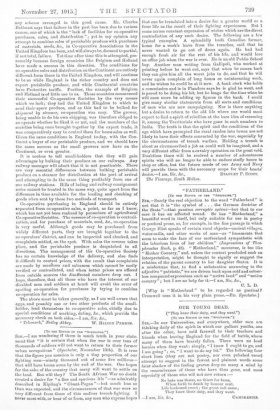ITo ins EDITOR OP TIER ”SrEarATon."1 SIR,—I am wondering if
there is much truth in your state- ment that " it is certain that when the war is over tens of thousands of soldiers will not want to return to their former urban occupations " (Spectator, November 18th). It is true that the figure you mention is only a tiny proportion of our fighting men—ninety thousand out of some five millions— that will have borne arms by the end of the war. One hopes for the sake of the country that many will want to settle on the land. But will they P The South African War no doubt created a desire for "a fine and spacious life "—so admirably described in Kipling's " Chant-Pagan "—but much less so than was expeoted, and the circumstances of that war were so very different from those of this endless trench-fighting. I never meet with, or bear of or from, any men who express hopes that can be translated into a desire for a greater world or a freer life as the result of their fighting experiences. But I come across constant expression of wishes which are the direct contradiction of any such desire. The following are a few typical examples. A splendidly built Canadian farmer, home for a week's leave from the trenches, said that he never wanted to go out of doors again. He had had enough fresh air for the rest of his life, and would lore an office job when the war is over. He is an old Public School boy. Another man writing from Gallipoli, who worked at printing before he went out, says that when he comes back they can give him all the worst jobs to do, and that he will never again complain of long hours or uninteresting work, and he wishes he could be at it now A bank clerk who holds a commission and is in Flanders says he is glad he went, and is proud to be doing his bit, but he longs for the time when be will once more be adding up figures in the bank. I could give many similar statements from all sorts and conditions of men who are now campaigning. Nor is there anything but a desire to return to the old life where one would most expect to find a spirit of rebellion at the bare idea of resuming it, among the Territorials who have gone in such numbers to India. The truth is that the spirit and the conditions of the age which have prompted the rural exodus into towns are not likely to have their effects converted by the war, especially by the circumstances of trench warfare. Holding a trench is about as circumscribed a job as could well be imagined, and a very different affair from a cavalry operation on the great veld. Doubtless there will be evolved a number of adventurous spirits who will no longer be able to endure stuffy hours in shop or office, but the future needs of our Army and Navy will provide them with the necessary scope for their hearts' desire.—I am, Sir, &a., STANLEY P. SCOTT. The Vicarage, South Molton.






































 Previous page
Previous page